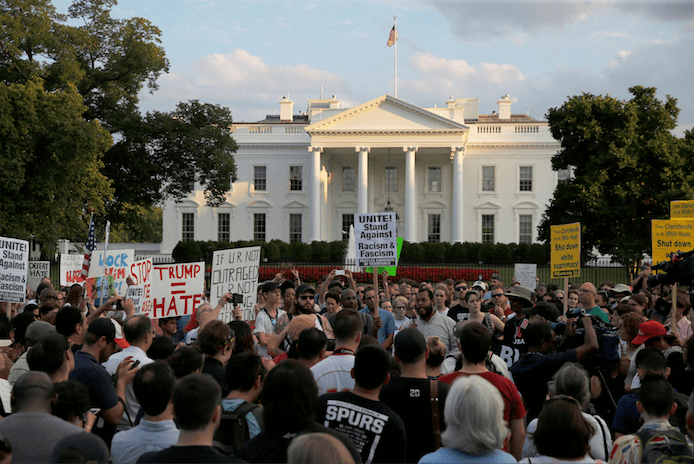by The Cowl Editor on August 31, 2017
Opinion

by Hannah Paxton ’19
Asst. Opinion Editor
Language matters—especially that of the political leader of this country. Words have the power to build and destroy, to praise and condemn, to confront and evade.
With his comment about the statue removal protests in Charlottesville, Virginia, coming from “both sides,” President Trump’s jargon clearly represents the hateful power of words. Rather than taking an impactful stand against brutality and hate, he opted to diffuse the blame by way of generalization.
The president’s initial response on Twitter all but dodges the root of the problem when he puts the emphasis on “all” Americans, generalizing instead of calling the assailants by name. While this is a start, it does not pinpoint the perpetrators for their unspeakable hostility.
There is no question that the attack in Charlottesville calls for an advance toward unity and peace, but in order to do so, it is important to recognize and condemn those who are responsible. When President Trump retracted his denunciation of “neo-Nazis, white supremacists, and other hate groups” he pardoned the extreme acts of contempt in the name of racial antipathy.
Too often acts of racial hostility are overlooked for the sake of maintaining a sense of peace and pleasing the general population. However, this is harmful to the notions of liberty and equality that America strives to achieve.
What happened in Charlottesville was not an attack from “both sides,” but an attempted display of superiority by racial bigots, and to say otherwise is to perpetuate a problem that has been firmly rooted in the country’s soil from its beginning.
In the past, President Trump has proved that he pays careful attention to word choice when he criticized President Barack Obama for incorrect phrasing in reference to “Islamist extremism,” as he thought it distracted from the issue of eliminating the threat of terrorism. The same logic should then be applied to the violence in Charlottesville.
Distinguishing the perpetrator of the violence is the first step in taking a stand against racial bigotry. In doing so, we gain a better understanding and from there we can take action.
Trump was right to put a name to the brutality, but to then disperse the blame to all sides is to take a step backwards. The anti-racist protests were peaceful, merely countering the aggression of the opposing side.
These protestors were not the ones who plowed a speeding car into innocent bystanders, resulting in death and injury. Yet, according to the president’s comment, they are meant to share the fault.
Grouping anti-racist and anti-fascist activists with racial bigots is a vast overgeneralization that negates the deeply-grounded issue of racism in the United States. It sends the message that any kind of counterattack, however peaceful, is destructive.
Additionally, it deflects the focus from the root of the problem. It comes from a place of ignorance, and in this case, one person’s ignorance hinders an entire country’s education. If Charlottesville is deemed nothing more than angry demonstrations from both sides, then bigotry is victorious.
Ignorance breeds fear and fear breeds hatred; the same hatred that brought a group of white supremacists to Charlottesville.